| Reviews & Columns |
|
Reviews DVD TV on DVD Blu-ray 4K UHD International DVDs In Theaters Reviews by Studio Video Games Features Collector Series DVDs Easter Egg Database Interviews DVD Talk Radio Feature Articles Columns Anime Talk DVD Savant Horror DVDs The M.O.D. Squad Art House HD Talk Silent DVD
|
DVD Talk Forum |
|
|
| Resources |
|
DVD Price Search Customer Service #'s RCE Info Links |
|
Columns
|
|
|
Anna Karenina
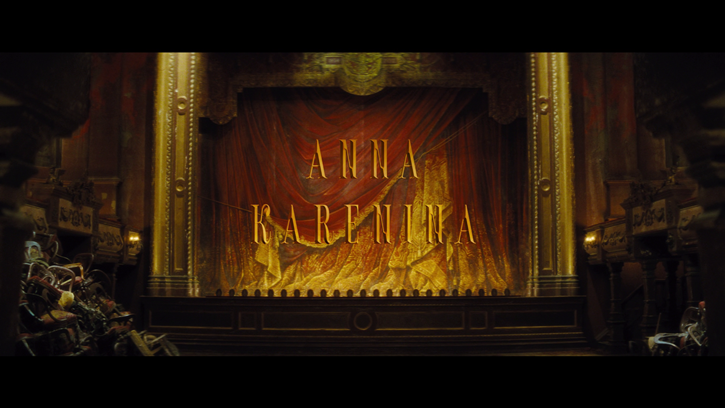
Anna Karenina is the latest adaptation to be filmed of Leo Tolstoy’s classic and acclaimed novel. This time around the film auteur and director bringing it all together for the big-screen is none other than the spectacularly gifted Joe Wright (Pride and Prejudice, Atonement), who brings with him an unusual and unique approach to the source material by turning it into a highly stylized visual splendor that is unlike anything else previously attempted with the source material.
Working with a script by Academy Award winning screenwriter Tom Stoppard (Shakespeare in Love, Empire of the Sun), this adaptation of Anna Karenina is filled with love, loss of love, and other complex human emotions that inflict human beings in situations of love or romance and that affects the many characters portrayed within the story. This is a film all about the way a romance sparks or love begins and how it can affect relationships, for good or for bad. That element of storytelling is at the heart of this film; squarely in the center.
The story’s main focus is upon the young Anna Karenina, who finds herself a married woman without marital happiness. She is married to the highly esteemed Russian Karenin (Jude Law), who is someone everyone looks to as an individual to cherish for the sake of Russia and it’s changing times. However, Anna she doesn’t have an emotional connection to Karenin that suggests this was a relationship structured around love.
It’s clear that the relationship faltered in a number of ways. He is constantly focused on working on his own duties to Russia and he doesn’t spend time to ask Anna what she wants or what she might possibly hope to accomplish beyond being the sole parental figure to their son, whom Anna raises without an element of clear emotional support from Karenin (not even between father and son).
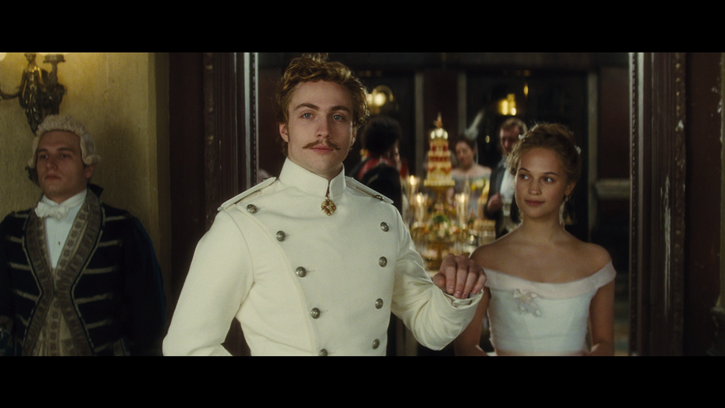
The story poses the statement “You Can’t Ask Why About Love” as part of the backdrop to all events surrounding the storyline. However, I would add to that statement that you can ask all about where love may have faltered. Anna and Karenin seem to have a lack of intimacy with their relationship.
There is a clear lack of physical affection in their union. It is apparent from both of them. This aspect of a struggling marriage is apparent in both sexual and non-sexual ways. True to Joe Wright’s affection as a director for displaying human intimacy, the camerawork makes it apparent that even a squeeze of the hand as an expression of love is missing, and Anna eventually finds this affection elsewhere, which Wright perfectly displays.
Karenin always gives off an aura of professionalism and of interest in his duties to Russia, but he seems far less concerned with the happiness of his wife. To Anna, he appears as someone who is cold and distant instead of warm and loving.
What causes the fundamental problem found within the course of this film (and the subsequent backdrop surrounding the entire working of the story) is that she falls in love with a charming officer, Vronsky (Taylor-Johnson). The two begin having an affair of passion and love and it isn’t long before Karenin and everyone else begins to recognize that something is going on between the two lovers.
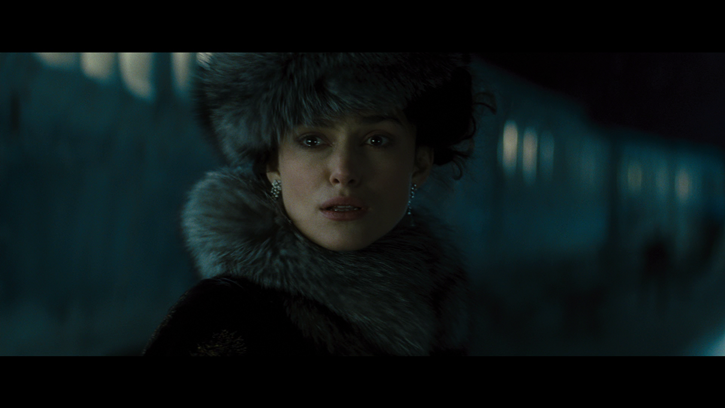
Joe Wright and Tom Stoppard have crafted a story together that is essentially an examination of love and it poses difficult to answer questions about the characters and their relationships: about how love works or doesn’t work between them. This is true of the approach to the story for the main characters of Anna, Karenin, and Vronsky. It is also the case for a small number of good supporting roles that seem to act to emphasize the main themes of the storyline centered upon Anna.
Joe Wright has done a brilliant job as the film’s director. I consider him as one of the greatest filmmakers currently working in the industry. Not only does he understand who to bring into working alongside him for his productions (as he has an amazing crew), but he has a delicate approach to directing actors that works well for the types of films he makes. He is great both visually and with the actors he works with, and that’s an increasingly rare accomplishment in cinema that makes his work all the more special.
One of the most interesting things about his approach to directing Anna Karenina is that he has to reflect both intimacy and lack of intimacy between the characters, and yet his filmmaking is inherently intimate in a way that is true to his unique directing approach. He looks at all of the characters with an intimate and delicate frame as director, and it makes the story more unique and compelling as a display of his own interpretations and explorations of these characters. It makes his version of Anna Karenina distinctly his own.
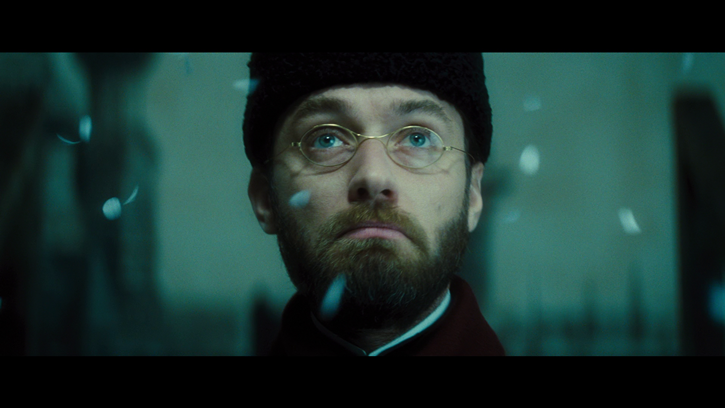
I am amazed by his visual splendor as a director and the way he used gorgeous close shots to demonstrate the beauty (or lack of beauty) between these characters. Yet what is perhaps the most stunning element of his work on Anna Karenina is the unique way in which he made it have a significant theatrical flair and spirit. He makes scenes flow into one another in a way some might scoff at but that others will find revolutionary as an approach for his adaptation.
Sequences in the film often play out in a frenzied manner where the stage seems to shift: you become aware that the film is approaching the material in a dreamlike state. This is a visually splendid approach in which one scene can end and the camera can shift to another “stage” of story and characters as if everything in the film is being performed on one massive, brilliant stage. This is part of the genius of the production design work by Sarah Greenwood and of Wright as the director.
Adding further to the dream-like quality in Anna Karenina is the great cinematography by Seamus McGarvey, who films scenes with a style that radically emphasizes the colors in sequences and which shifts some scenes between light and darkness within moments. It completely surprised and amazed me. It’s brilliant, because it makes the entire piece so flamboyantly theatrical and dream-like that you can become completely absorbed by it.
The costumes by Jacqueline Durran are brilliant. The beauty of the costumes is so mesmerizing and it adds visual splendor to the proceedings as well. She’s a great costume designer, and she has contributed some of her best work to the films of Joe Wright (having received Academy Award nominations for her work on Pride and Prejudice and Atonement; not to mention the Academy Award win she received for Best Costume Designs with this film, Anna Karenina).
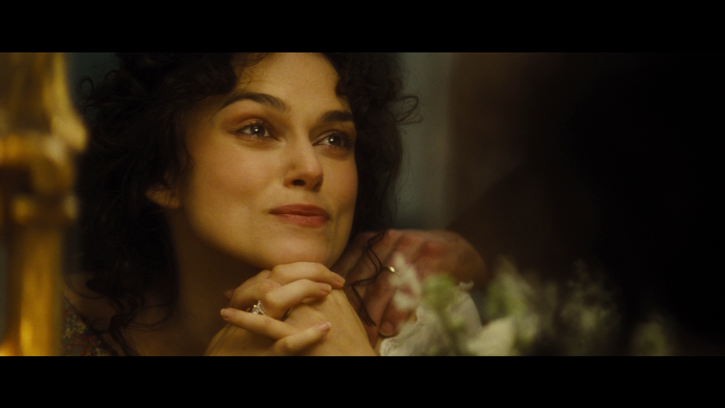
Perhaps one of my favorite things about Joe Wright’s films is looking forward to the music. Composer Dario Marianelli is his longtime collaborator (only breaking from the pairing so Wright could work with longtime friends The Chemical Brothers for a brilliant score for a certain thrilled called Hanna). I am such a fan of Marianelli. I cherish his scores.
Marianelli has a classical style that is unlike anything else heard in cinema today. He makes his compositions feels as though they are already timeless. His achingly beautiful score music is an essential element of the film and it makes every scene even more beautiful in style and approach: Marianelli makes music that perfectly complements the imagery of Wright. How extraordinary it is that he has been able to continue collaborating with Wright for so many fantastic scores. I love the music of Anna Karenina.
If there is a fault to Anna Karenina it is probably that the screenplay has a lot of ground it wants to cover and the film simply cannot be as expansive as many would undoubtedly have hoped to experience. However, Stoppard has done a good job in creating a script for an excellent film of ambiguity and complex characters. It may not perfectly fit everyone’s views of Anna Karenina, yet it does a good job for what it does accomplish in bringing characterization forward to the metaphorical table. There is plenty of room for interpretation of Anna Karenina and with the screenplay Stoppard seems to have approached the material with that in mind.
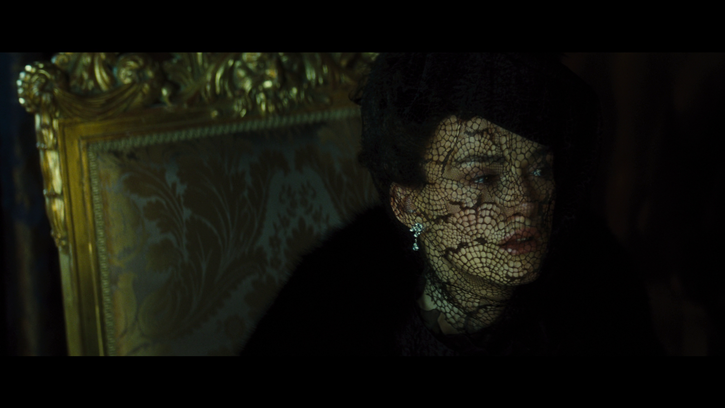
Keira Knightley is radiant as Anna Karenina. Her performance is complex and bold in approach. Not everyone was perfectly pleased with her performance in the film, and that is likely because she doesn’t necessarily make it clear why Anna is in love with Vronsky: is it because she is so unhappy with Karenin and Vronsky is someone who provided her with an escape from having great unhappiness? Or would Anna and Vronsky have fallen in love without Karenin around? Granted, these questions go to the heart of the question of why people fall in love and it is an essential element in the foundations in the screenplay.
Perhaps the greatest performance was the understated approach given to Karenin by Jude Law. This is one of his absolute greatest performances, and it is one filled with a mature multi-layer approach that makes the character all the more intriguing. One begins to wonder about him. It appears as though Karenin is cold and unloving to Anna in many instances, but something in Jude Law’s performance still manages to suggest that the opposite might well be true. It’s a performance in which one wonders if he perhaps had great love for Anna Karenina, a love poorly exemplified by his behavior but that seems to exist underneath the surface. Would marriage counseling have helped the couple? One might wonder about these questions.
Anna Karenina is one of the most ambitious, entertaining, and well-made films of 2012. It’s also one of the most underrated. Reactions from critics and general movie-going audiences has been somewhat mixed (despite several Academy Award nominations and an undeniably impressive group of individuals involved in the production in front of and behind the scenes). Joe Wright has crafted an intelligent, artistic, and visionary film with great visual splendor and emotional depth. This is a unique and entirely worthwhile adaptation of one of literature’s most beloved works.
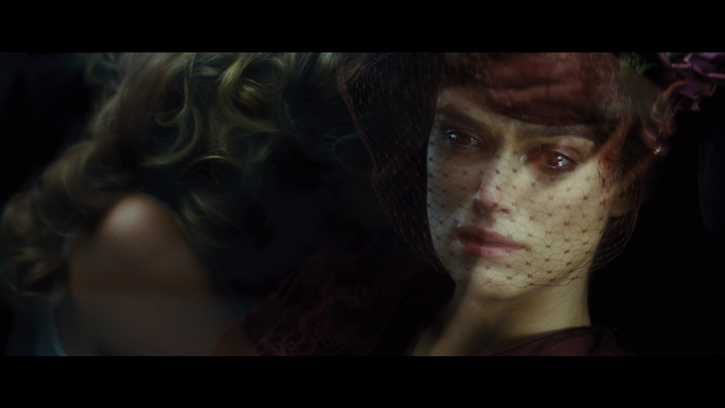
The Blu-ray:
Video:
Anna Karenina arrives on Blu-ray with a 1080p High Definition transfer that presents the film in the original theatrical aspect ratio of 2.35:1 widescreen. The image quality is impressive and it’s something that helps to uphold the brilliant cinematography of Seamus McGarvey. Colors look vivid and lush and the transfer retains fine detail and depth throughout the entire presentation.
Audio:
The audio presentation for Anna Karenina is another stellar aspect of the technical presentation. Composer Dario Marianelli has crafted a sweepingly beautiful score and it is well-presented in lossless quality with an immersive 5.1 DTS-HD Master Audio presentation. The audio has the qualities one would expect for a costume-drama, with clear emphasis on the dialogue. Yet the score music and sound effects sweep in and transport the film to higher levels at almost every turn and the film is all the more incredible for it. This is a technically miraculous presentation with great clarity and sound design inventiveness.
Subtitles are available in English SDH (for the deaf and hard of hearing), Spanish, and French.
Extras:
The supplemental section of the disc is less packed with extras than one might expect for a film of this grandeur, but there are some notable inclusions. Fans will be most pleased by having an Audio Commentary with Director Joe Wright included on the entire feature and the making of the film. There are also eight deleted scenes (totaling 13 minutes of excised footage), and six short featurettes (all presented in High Definition and detailed below):
Adapting Tolstoy (5 min.) has Director Wright and Screenwriter Stoppard discussing the pair’s process of working to adapt Tolstoy’s novel.
On set with Director Joe Wright (5 min.) is a brief behind the scenes feature showcasing some moments on set with the film’s director.
An Epic Story about Love (5 min.) features interviews with important cast and crew members; discussing the themes of love as relevant to the story of Anna Karenina.
Kiera as Anna (4 min.) explores the immense contribution of Keira Knightley in the film’s main role as Anna Karenina.
Dressing Anna (3 min.) features Anna Karenina costume designer Jacqueline Durran, and is all about the costumes utilized.
Time-lapse Photography (8 min.) is included for the construction of the main stage set used for Anna Karenina.
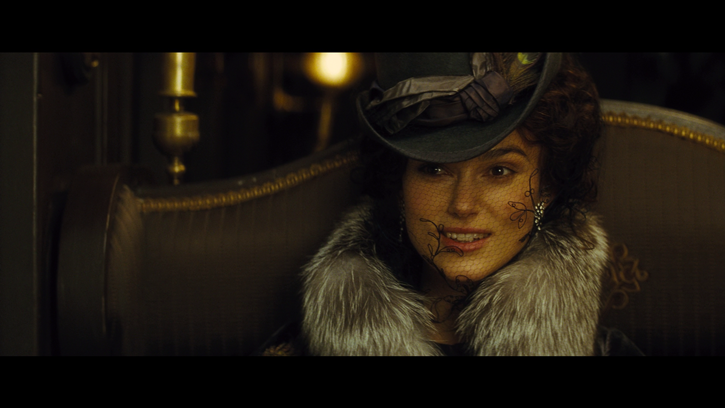
Final Thoughts:
Anna Karenina is one of the best films of the year. This Academy Award winning film (winner of Best Costume Design - Jacqueline Durran) is sweepingly beautiful, epic, intelligent, and it is entirely compelling from beginning to end. Audiences who enjoy period pieces with an added element of theatrically and post-modernism will especially appreciate this artful adaptation of Leo Tolstoy’s classic novel.
Highly Recommended.
Neil Lumbard is a lifelong fan of cinema. He aspires to make movies and has written two screenplays on spec. He loves writing, and currently does in Texas.
|
| Popular Reviews |
| Sponsored Links |
|
|
| Sponsored Links |
|
|
| Release List | Reviews | Shop | Newsletter | Forum | DVD Giveaways | Blu-Ray | Advertise |
|
Copyright 2024 DVDTalk.com All Rights Reserved. Legal Info, Privacy Policy, Terms of Use,
Manage Preferences,
Your Privacy Choices | |||||||












